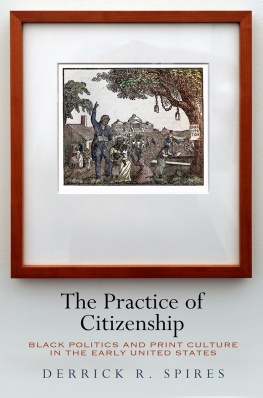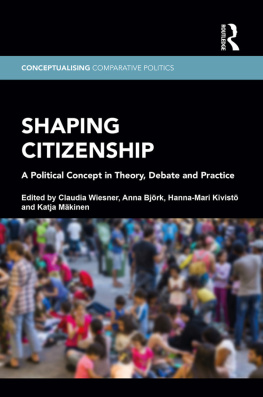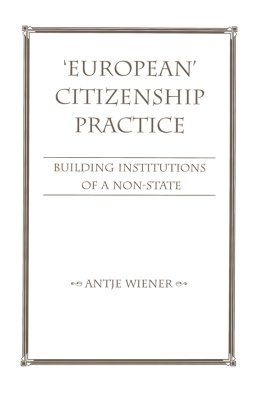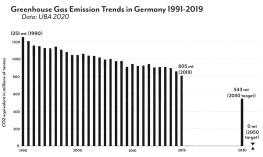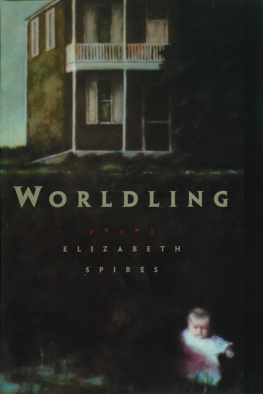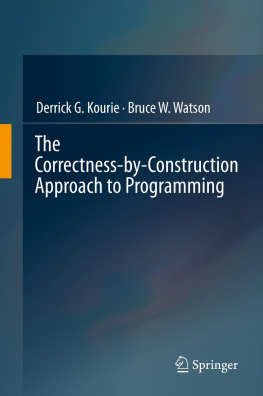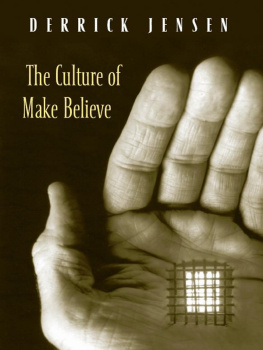Spires Derrick R. - The Practice of Citizenship
Here you can read online Spires Derrick R. - The Practice of Citizenship full text of the book (entire story) in english for free. Download pdf and epub, get meaning, cover and reviews about this ebook. year: 2019, publisher: University of Pennsylvania Press, genre: Politics. Description of the work, (preface) as well as reviews are available. Best literature library LitArk.com created for fans of good reading and offers a wide selection of genres:
Romance novel
Science fiction
Adventure
Detective
Science
History
Home and family
Prose
Art
Politics
Computer
Non-fiction
Religion
Business
Children
Humor
Choose a favorite category and find really read worthwhile books. Enjoy immersion in the world of imagination, feel the emotions of the characters or learn something new for yourself, make an fascinating discovery.
- Book:The Practice of Citizenship
- Author:
- Publisher:University of Pennsylvania Press
- Genre:
- Year:2019
- Rating:5 / 5
- Favourites:Add to favourites
- Your mark:
- 100
- 1
- 2
- 3
- 4
- 5
The Practice of Citizenship: summary, description and annotation
We offer to read an annotation, description, summary or preface (depends on what the author of the book "The Practice of Citizenship" wrote himself). If you haven't found the necessary information about the book — write in the comments, we will try to find it.
The Practice of Citizenship — read online for free the complete book (whole text) full work
Below is the text of the book, divided by pages. System saving the place of the last page read, allows you to conveniently read the book "The Practice of Citizenship" online for free, without having to search again every time where you left off. Put a bookmark, and you can go to the page where you finished reading at any time.
Font size:
Interval:
Bookmark:

The Practice of Citizenship
THE PRACTICE OF CITIZENSHIP

Black Politics and Print Culture in the Early United States
Derrick R. Spires

UNIVERSITY OF PENNSYLVANIA PRESS
PHILADELPHIA
Copyright 2019 University of Pennsylvania Press
All rights reserved.
Except for brief quotations used for purposes of review or scholarly citation, none of this book may be reproduced in any form by any means without written permission from the publisher.
Published by
University of Pennsylvania Press
Philadelphia, Pennsylvania 19104-4112
www.upenn.edu/pennpress
Printed in the United States of America on acid-free paper
1 3 5 7 9 10 8 6 4 2
Library of Congress Cataloging-in-Publication Data
ISBN 978-0-8122-5080-0
For Daisy and Nafissa
CONTENTS

INTRODUCTION

Black Theorizing
Reimagining a Beautiful but Baneful Object
Fellow Citizens
This book is about the questions and methodologies that emerge when we focus our analyses on the concerns black writers made foremost and on understanding these concerns in the terms they set forth. When we approach early black writing through a print culture made up of pamphlets, poems, sketches, orations, appeals, treatises, convention proceedings, letters, mastheads, gift books, petitions, autobiographies, and a host of other kinds of documents by black individuals and collectives, citizenship quickly emerges as a key term and vexed concept. A perusal of Dorothy Porters touchstone Early Negro Writings (1971) reveals a collection of addresses on the abolition of the slave trade from 1808 to 1815 that begin, Fathers, Brethren, and Fellow Citizens, or simply, Citizens.
These explicit and implicit invocations of citizenship throughout early black print culture suggest that citizenship was a potent concept. Yet, it is still one of the most understudied by critics of early African American literature. Its not that scholars havent taken up questions of black citizenshipthat is, whether or not black Americans were U.S. citizens, legal persons, or humans before the law; the ways they made the case for their citizenship; and the multiform ways (local and national; cultural, economic, and political) that white Americans made clear their refusal to recognize black Americans as equal citizens, if citizens at all. Overemphasizing Douglass flattens out a vibrant intellectual network of newspaper correspondents, convention goers, pamphleteers, and artists, whose key texts and forms were more often than not generated collectively. Hence, this book demonstrates the communal facets of citizenship discourse in black print culture to show that individuals and collectives were both critical to theorizing and practicing citizenship. What I demonstrate in this book stems from answering the following key questions: What happens to our thinking about citizenship if, instead of reading black writers as reacting to or a presence in a largely white-defined discourse, we base our working definitions of citizenship on black writers proactive attempts to describe their own political work? What happens when we base our working definition of citizenship on black writers texts written explicitly to and for black communities?
The proliferation of the phrase fellow citizen was more than a rhetorical device or ironic signifying. The Practice of Citizenship tells a story about how black writers theorized and practiced citizenship in the early United States through a robust print culture. It insists on exploring citizenship not just from the perspective of law and its framing of black people and others but also from the perspective of black Americans, who were some of the most important theorists of citizenship, both then and now. Yes, the texts I analyze here argue for black citizenship, but the citizenship for which they argue is not the same citizenship from which black Americans had been and continue to be excluded. Black writers argue for more than simple inclusion; indeed, they argue for the kind of political world in which they would not have to make such an argument. They argue for and actively seek to create a world otherwise. To understand this theory, The Practice of Citizenship moves beyond simply defining citizenship and pursues the processes by which black citizens used print to articulate and enact the citizenship they theorized. How black print culture imagined citizenship is therefore as central to this study as the citizenship they imagined, and by the end of this book, I hope it is clear that the process of theorizing does the work of citizenship.
I examine the parallel development of U.S. citizenship and early black print culture through key understudied flashpoints (the 1793 Philadelphia yellow fever epidemic and outbreaks of antislavery violence in 1856), movements (black state conventions and vigilance committees), intellectuals (James McCune Smith and William J. Wilson), and genres (the sketch, ballad, and convention minutes). I begin with events recorded in Absalom Jones and Richard Allens A Narrative of the Proceedings of the Black People (1794) and end with Frances Ellen Watkins Harpers sketches for the last issues of the Anglo-African Magazine (18591860) just before the Civil War. Black citizenship theorizing developed over time as a collaborative, multimedia, polygeneric cultural and intellectual process for sustaining life in a fundamentally unjust society. For these writers, citizenship (and blackness itself) emerges not as a destination, an enacted identity, or static relation to a state but rather as a self-reflexive, dialectical process of becoming.
As state policies and public discourse around citizenship were becoming more racially restrictive, black activists articulated an expansive, practicebased theory of citizenship, not as a common identity as such but rather as a set of common practices: political participation, mutual aid, critique and revolution, and the myriad daily interactions between people living in the same spaces, both physical and virtual. They reject definitions of citizen based on who a person is, a preordained or predefined subject or subjectivity, in favor of definitions grounded in the active engagement in the process of creating and maintaining collectivity, whether defined as state, community, or other affiliative structure.custom shape these activities (negatively and positively), but they do not make citizenship or citizens. Practicing citizenship makes citizens.
Citizenship practices create citizens by enabling them, to quote Michel de Certeau, to take up a position in the network of social relations made up not only of currently recognized citizens but also of people who, by virtue of their engagement with and contribution to the whole, become citizens. Practices form a tradition insofar as they draw on catalogues of past activities and habits (from ways of worship and manners of speech to understandings of gender and sexuality, race and class), but they constantly respond to context and the need to make sense of the now. My sense of citizenship as a practice, then, is capacious, embracing recognizable acts, such as voting, alongside less structured acts, such as greeting others on the street. Both acts can signal membership in a political body, and exclusion or refusal (in the act of greeting) can become mechanisms of erasure or identifying those outside the bounds of citizen. That is, citizenship and struggles for citizenship happen outside of official state institutions, in those very spaces black writers consistently cite as life sustaining. And it is through these sites that restrictive notions of belonging can be contested and in which alternate models can be theorized and practiced.
Next pageFont size:
Interval:
Bookmark:
Similar books «The Practice of Citizenship»
Look at similar books to The Practice of Citizenship. We have selected literature similar in name and meaning in the hope of providing readers with more options to find new, interesting, not yet read works.
Discussion, reviews of the book The Practice of Citizenship and just readers' own opinions. Leave your comments, write what you think about the work, its meaning or the main characters. Specify what exactly you liked and what you didn't like, and why you think so.

